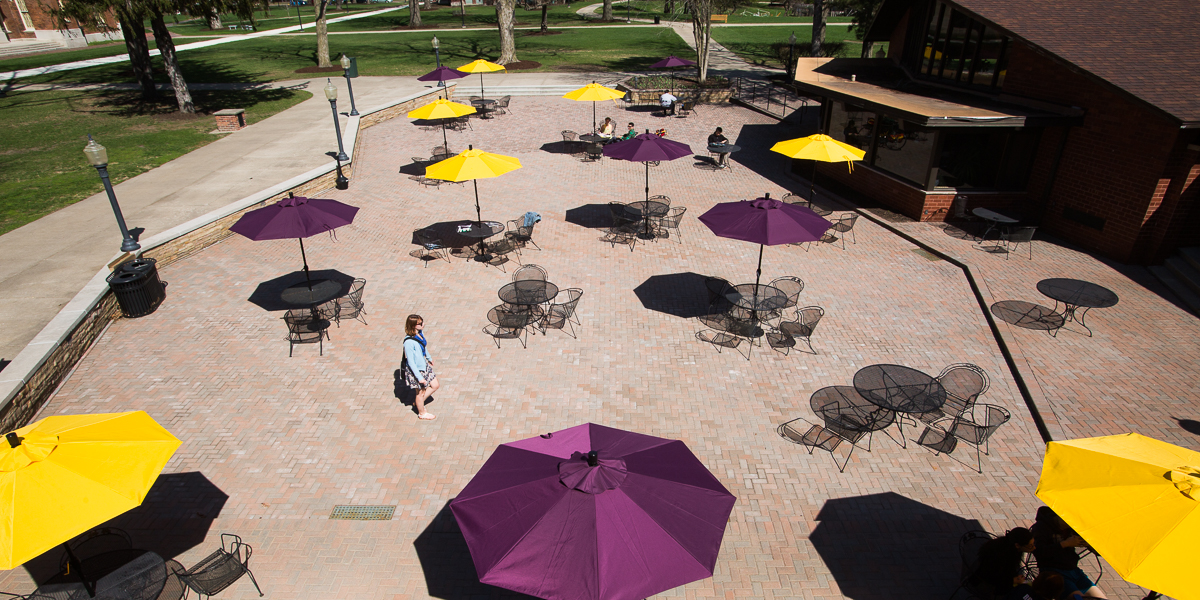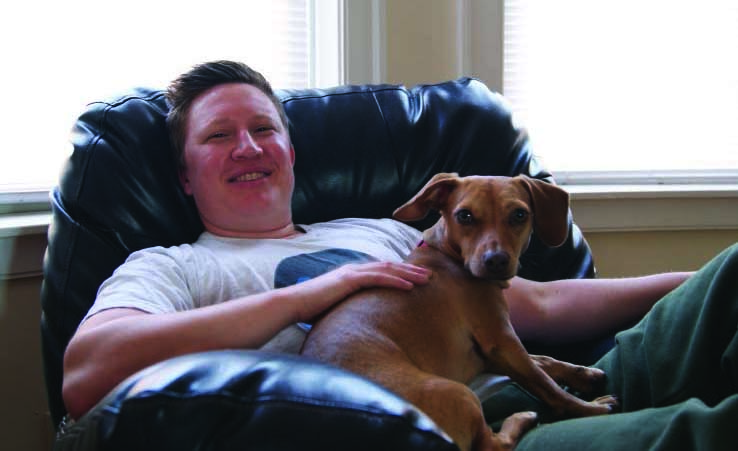



Photo: Sean at home in Chicago with his son's dog, Munchkin.
Photos and Text by Philippa Cumming Stasiuk '96
Sean Gormley '96 and I met as neighbors in Post 9, an experimental dorm housing an assortment of misfits united by a penchant for excess and the liberal application of hair henna. We forged our friendship through hacky sack, playing on the patio behind the Gizmo before, after, (and sometimes during) class. It was a different time. My surname was Cumming. Sean was still going by the name of Sue.
We graduated from Knox in 1996 and, between living on different coasts and then continents, lost touch sometime in our 30s. He couldn't come to my wedding, but he did send me a fantastic fondue set. Like most of us from our Knox days, I read about Sean's new name when he announced it as a birthday present to himself on Facebook last year.
Although Sean came out as transgender with close friends and family as early as 2004, two years ago, something happened to trigger his decision to physically transition publicly. He and his son were finishing lunch at a Chicago diner near the school where Sean teaches middle school science. Before leaving, he took Gavin into the ladies' room, but the five-year-old caught the mistake immediately. He demanded to know why he and his dad had gone into the wrong bathroom.
It was a watershed moment. Though openly transgender with friends in his private life, at school he was still Ms. Gormley, and at the diner he'd worried about running into a student in the men's room. Now his son had just witnessed him living a double life. Sean had been compartmentalizing his gender identity depending on where he was or who he was with-and he felt ashamed. He knew then that he had to be out in all parts of his life.
This fall, I visited Sean in Mayfair, a neighborhood in Chicago's North Side. Now openly living as a transgender man, he's currently undergoing the two year physical transformation needed to match his body to the gender he's been associating with since birth. He's an FTM-female to male transsexual. Six months into a two-year course of testosterone, a steroid used to essentially induce a second puberty, Sean's voice cracks when he talks, his face is rounder than the one I remember, and he has obvious muscle definition in his arms. He now shaves the blond whiskers that poke out above his lips.
Following are excerpts from our conversation:
P: I knew you best at Knox. What were you thinking about gender identity then?
S: At Knox, I started to learn the words for it. But I didn't want to face it. I was scared. Then I took a gender identity class and that scared me even more. I worried that I'd be perceived as a freak. I remember around that same time asking my parents if I was intersex when I was born. They said no, and I burst into tears. I said, "Something is wrong with me, and I'm trying to figure it out."
P: How did you begin the process to publicly transition?
S: I had a conversation with my principal. She's very practical. She said, "Alright. Let's figure out how we're going to do this." She helped me write a letter to my students' parents explaining that I was transgender and that my preferred name is Mr. Sean Gormley.
P: Your colleagues, your students, and their parents...What were their reactions?
S: I asked my principal not to tell me if there were complaints from any parents. I didn't want to be biased against their kids. But almost everybody just took it in stride. And it wasn't really any secret. When I got hired in 2008, I wore a man's suit.
In the beginning, it took my students a while to use the right pronoun. I told them my pronoun is "he," and please refer to me that way. That first day was a little hard and uncomfortable. But I've been really lucky. People say the wrong thing out of ignorance and that hurts my feelings. But that's not the same as discrimination.
P: Tell me about the bureaucratic challenges of transitioning.
S: That's been intense. On the day I went to the courthouse, I wished I had someone with me. But nothing bad happened. I was just scared. The paperwork had to be notarized and then filed at the courthouse. Then I had to wait almost two months. During that time, I had to publish my name change in a newspaper. There's a legal paper that does that. On the day of my court date, I didn't like the way the judge looked at me. But he didn't say anything and he approved it. I did that alone, too. Then I had to go to the social security office and the DMV to change my license. The best part was changing my gender box on my license because all I needed was a letter from my doctor.
P: What about medical care?
S: The Howard Brown Center here in Chicago is amazing. They focus on transgender and LGBT health. I thought getting hormones would be one big rigmarole. The day I got hormones, they didn't ask me questions to try and determine if this was right for me. They use a process called informed consent, which allows members of the trans community to make their own decisions about their bodies. We fast-forwarded over all that. I think because I was a late bloomer. A lot of people who are transitioning are in their 20s.
P: Do you have a transgender support network?
S: Around 2006, I went to an FTM support group. Everybody was transitioning, and I didn't want to do that at the time, so it made me feel worse. I stopped going. The people I enjoy hanging out with are from another support group. That's the only community I feel I belong in. And school. They've been one of my biggest supports. I wouldn't have wanted them to be overly supportive. They're in the middle. It's a non-issue. Period.
P: You said your dad is your role model and that your mom has been slower to accept the transition. Why do you think that is?
S: My ex has some of the same feelings as my mom. She once told me, "I know that to you, this Sue person never existed. But to your mom she was a real person—her daughter. And she doesn't want to lose that person in her life." I'm not saying I didn't exist. But it was like wearing a costume that I never took off. Everyone thinks you're the costume. But you know you're the person underneath. You knew me in my 20s. The most important thing to me was fitting in, being liked, and having friends. I did what I thought I had to do to get that. But I was drunk and high every day. And nobody really knew me.
P: Have you found peace?
S: Not yet. I'm hoping that when my transition is over, that will be the answer. I didn't want that to be the answer for a long time. I didn't want to have to physically transform. I just wanted people to believe me. I wanted people to see me without having to do that.
P: Are you lonely?
S: Yeah. I never got to have male friends. I've always had girlfriends, but I missed out on having buddies. It seems like such a big part of everyone else's life. But my pals from my one support group are starting to treat me as one of the guys. And when I became Mr. Gormley, some of my colleagues invited me to Man Club. We go out to dinner or play golf. But everyone's really busy.
P: We're past 40 now. Do you wish you'd transitioned in your 20s?
S: I don't know. The world was so different. When I thought about doing it, I thought I'd have to take two years off from my life, move, and start as a totally new person. It'd be like killing myself and faking my death. That was the only way I could imagine it—killing Sue and becoming someone new. I didn't know I could keep my job, keep my friends, keep my city.
I'm a pretty impulsive person. This is the one thing in life I didn't rush. I gave myself a break. I did my best.
2
high tunnels on campus
where students grow vegetables for the Knox community.